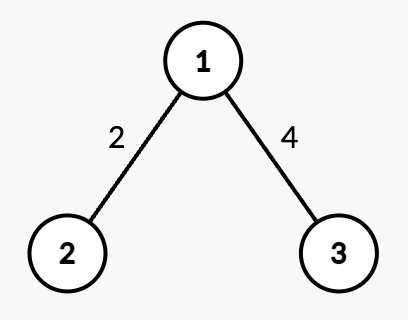Description
You are given an integer n and an undirected, weighted tree rooted at node 1 with n nodes numbered from 1 to n. This is represented by a 2D array edges of length n - 1, where edges[i] = [ui, vi, wi] indicates an undirected edge from node ui to vi with weight wi.
You are also given a 2D integer array queries of length q, where each queries[i] is either:
[1, u, v, w']– Update the weight of the edge between nodesuandvtow', where(u, v)is guaranteed to be an edge present inedges.[2, x]– Compute the shortest path distance from the root node 1 to nodex.
Return an integer array answer, where answer[i] is the shortest path distance from node 1 to x for the ith query of [2, x].
Example 1:
Input: n = 2, edges = [[1,2,7]], queries = [[2,2],[1,1,2,4],[2,2]]
Output: [7,4]
Explanation:

- Query
[2,2]: The shortest path from root node 1 to node 2 is 7. - Query
[1,1,2,4]: The weight of edge(1,2)changes from 7 to 4. - Query
[2,2]: The shortest path from root node 1 to node 2 is 4.
Example 2:
Input: n = 3, edges = [[1,2,2],[1,3,4]], queries = [[2,1],[2,3],[1,1,3,7],[2,2],[2,3]]
Output: [0,4,2,7]
Explanation:

- Query
[2,1]: The shortest path from root node 1 to node 1 is 0. - Query
[2,3]: The shortest path from root node 1 to node 3 is 4. - Query
[1,1,3,7]: The weight of edge(1,3)changes from 4 to 7. - Query
[2,2]: The shortest path from root node 1 to node 2 is 2. - Query
[2,3]: The shortest path from root node 1 to node 3 is 7.
Example 3:
Input: n = 4, edges = [[1,2,2],[2,3,1],[3,4,5]], queries = [[2,4],[2,3],[1,2,3,3],[2,2],[2,3]]
Output: [8,3,2,5]
Explanation:

- Query
[2,4]: The shortest path from root node 1 to node 4 consists of edges(1,2),(2,3), and(3,4)with weights2 + 1 + 5 = 8. - Query
[2,3]: The shortest path from root node 1 to node 3 consists of edges(1,2)and(2,3)with weights2 + 1 = 3. - Query
[1,2,3,3]: The weight of edge(2,3)changes from 1 to 3. - Query
[2,2]: The shortest path from root node 1 to node 2 is 2. - Query
[2,3]: The shortest path from root node 1 to node 3 consists of edges(1,2)and(2,3)with updated weights2 + 3 = 5.
Constraints:
1 <= n <= 105edges.length == n - 1edges[i] == [ui, vi, wi]1 <= ui, vi <= n1 <= wi <= 104- The input is generated such that
edgesrepresents a valid tree. 1 <= queries.length == q <= 105queries[i].length == 2or4queries[i] == [1, u, v, w']or,queries[i] == [2, x]1 <= u, v, x <= n(u, v)is always an edge fromedges.1 <= w' <= 104
Solution
Python3
class SegmentTree:
def __init__(self, arr):
self.n = len(arr)
self.tree = [0] * (4 * self.n)
self.build(1, 0, self.n - 1, arr)
def build(self, v, tl, tr, arr):
if tl == tr:
self.tree[v] = arr[tl]
else:
tm = tl + (tr - tl) // 2
self.build(v * 2, tl, tm, arr)
self.build(v * 2 + 1, tm + 1, tr, arr)
self.tree[v] = self.tree[v * 2] + self.tree[v * 2 + 1]
def queryHelper(self, l, r):
return self.query(1, 0, self.n - 1, l, r)
def query(self, v, tl, tr, l, r):
if l > r: return 0
if tl == l and tr == r:
return self.tree[v]
else:
tm = tl + (tr - tl) // 2
return self.query(v * 2, tl, tm, l, min(tm, r)) + self.query(v * 2 + 1, tm + 1, tr, max(tm + 1, l), r)
def updateHelper(self, pos, value):
self.update(1, 0, self.n - 1, pos, value)
def update(self, v, tl, tr, pos, value):
if tl == tr:
self.tree[v] = value
else:
tm = tl + (tr - tl) // 2
if pos <= tm:
self.update(v * 2, tl, tm, pos, value)
else:
self.update(v * 2 + 1, tm + 1, tr, pos, value)
self.tree[v] = self.tree[v * 2] + self.tree[v * 2 + 1]
class Solution:
def treeQueries(self, n: int, edges: List[List[int]], queries: List[List[int]]) -> List[int]:
graph = defaultdict(list)
for a, b, w in edges:
graph[a].append((b, w))
graph[b].append((a, w))
flat_tree = []
tin = [0] * (n + 1)
tout = [0] * (n + 1)
def dfs(node, prev, weight):
flat_tree.append(weight)
tin[node] = len(flat_tree) - 1
for adj, w2 in graph[node]:
if adj != prev:
dfs(adj, node, w2)
flat_tree.append(-weight)
tout[node] = len(flat_tree) - 1
dfs(1, -1, 0)
res = []
st = SegmentTree(flat_tree)
for q in queries:
if q[0] == 1:
_, a, b, w = q
if a > b:
a, b = b, a
node_in, node_out = tin[b], tout[b]
st.updateHelper(node_in, w)
st.updateHelper(node_out, -w)
else:
node = q[1]
node_out = tin[node]
res.append(st.queryHelper(0, node_out))
return res